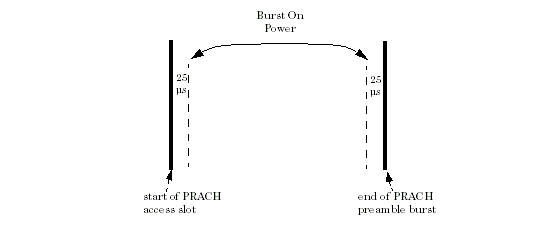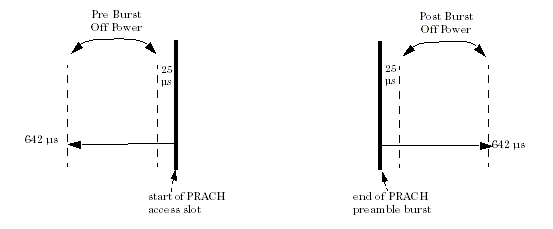PRACH Transmit On/Off Power Measurement Description
Last updated: January 16, 2009
- How is a PRACH Transmit On/Off Power Measurement Made?
- PRACH Transmit On/Off Power Measurement Parameters
- PRACH Transmit On/Off Power Measurement Results
- Key 3GPP Tests Performed Using the PRACH Transmit On/Off Power Measurement
- Input Signal Requirements
- Measurement Calibration
How is a PRACH Transmit On/Off Power Measurement Made?
Before initiating a PRACH transmit on/off measurement, turn the UE on and wait for it to camp to the test set's signal. When the PRACH transmit on/off power measurement is initiated, the test set sets Call Limit State to On to prevent successful call connection, then pages the UE. This forces the UE to transmit PRACH preamble bursts.
The test set then measures the "on" power of the first PRACH preamble burst from the UE. The test set measures the average power (without an RRC filter present) from 25 µs after the start of the PRACH access slot, to 25 µs before the end of the PRACH preamble burst (see Burst On Power Measurement Interval ).
The test set then measures the "off" power before and after a subsequent PRACH preamble burst ("Pre Burst Off Power" and "Post Burst Off Power," respectively). The test set measures the average power with an RRC filter in place (Root-Raised Cosine filter response with a roll off of alpha = 0.22 and a bandwidth equal to the chip rate). The Pre Burst Off Power is measured from 642 µs before the start of the PRACH access slot to 25 µs before the start of the PRACH access slot. Depending upon your test set's hardware configuration (see www.keysight.com/find/8960upgrades), the Post Burst Off Power is measured from either 25 µs or 100 µs after the end of the PRACH preamble burst to 642 µs after the end of the PRACH preamble burst. See Burst Off Power Measurement Intervals .
The PRACH transmit on/off power measurement is triggered by a combination of RF rise and protocol. The test set must first receive an RF rise which is at least -45 dBm, and which is no more than 9 dB below the expected power ( Initial PRACH TX Power if Power Control is set to Auto, or Manual Power if Power Control is set to Manual; see Receiver Control ). The test set then uses this RF rise to determine in which PRACH access slot the PRACH preamble burst is contained. The protocol trigger then triggers the measurement on that access slot.
Measurement Behavior
The UE must be camped to the test set and in idle mode before performing the
PRACH Transmit On/Off Power
measurement.
To perform the PRACH transmit on/off power measurement, you must set Available Subchannels (Bit Mask) to only allow one available subchannel.
You must also set
PRACH Preambles
to at least 3 before initiating this measurement. It is recommended that you set
PRACH Preambles
to
4
,
PRACH Ramping Cycles (MMAX)
to
1
, and
Call Limit State
to
Off
before initiating this measurement to minimize issues after the measurement has completed. See the following:
- Recommended PRACH Preambles and PRACH Ramping Cycles (MMAX) settings
- Importance of Setting Call Limit State to Off before Initiating a PRACH Measurement
- Test set may lock up if operations are attempted before the UE completes its PRACH sequence
No other measurements can be running when a PRACH transmit on/off power measurement is performed. If any measurements are running when a PRACH transmit on/off power measurement is initiated, they are closed and a message is displayed to indicate that they were closed.
Other Considerations
To change the UE's
Initial PRACH TX Power
level (which is reported by the
Burst On Power
result), you can change
Primary CPICH TX Power
,
Uplink Interference
,
Constant Value
,
Cell Power
and/or
CPICH RSCP (Received Signal Code Power)
. If you change
Primary CPICH TX Power
,
Uplink Interference
, or
Constant Value
, you must force the UE to re-read the BCCH before initiating the measurement (so that it will use the same values for these settings as the test set when calculating the power of its initial PRACH preamble). If your UE supports the
Broadcast Channel (BCCH) Update Procedure (SIB Contents)
, set
BCCH Update Page
to
Auto
to force the UE to re-read the BCCH. If your UE does not support the BCCH Update procedure, see
BCCH Update Page
for suggestions on forcing the UE to re-read the BCCH.
PRACH Transmit On/Off Power Measurement Parameters
- Measurement Timeout: (see Measurement Timeouts )
-
Off Power Limit
Sets the requirement (in dBm) for the measured "off" power ( Pre Burst Off Power and Post Burst Off Power ).
-
Open Loop Power Error Upper Limit
Sets the upper limit (in dB) for the difference between the measured "on" power ( Burst On Power ) and the expected power ( Initial PRACH TX Power if Power Control is set to Auto, or Manual Power if Power Control is set to Manual, see Receiver Control ).
-
Open Loop Power Error Lower Limit
Sets the lower limit (in dB) for the difference between the measured "on" power ( Burst On Power ) and the expected power ( Initial PRACH TX Power if Power Control is set to Auto, or Manual Power if Power Control is set to Manual, see Receiver Control ).
PRACH Transmit On/Off Power Measurement Results
-
Pre Burst Off Power
This result returns the RRC filtered average "off" power (in dBm) before the PRACH preamble burst (see How is a PRACH Transmit On/Off Power Measurement Made? ); as well as pass or fail which indicates whether the power is below the requirement set by Off Power Limit .
-
Burst On Power
This result returns the average "on" power (in dBm) (see How is a PRACH Transmit On/Off Power Measurement Made? ).
-
Open Loop Power Error
This result returns the difference between the Burst On Power and the expected power based on open loop power control, as well as pass or fail which indicates whether the error is within the limits set by Open Loop Power Error Upper Limit and Open Loop Power Error Lower Limit .
-
Post Burst Off Power
This result returns the RRC filtered average "off" power (in dBm) after the PRACH preamble burst (see How is a PRACH Transmit On/Off Power Measurement Made? ), as well as pass/fail, indicating whether the power is below the requirement set by Off Power Limit (see PRACH Transmit On/Off Power Measurement Parameters ).
Key 3GPP Tests Performed Using the PRACH Transmit On/Off Power Measurement
The "on" power measurement tests the open loop power control of the UE (3GPP TS 34.121, 5.4.1), while the "off" power measurement tests for unnecessary system signal leakage power (3GPP TS 34.121, 5.5). This measurement measures both the "on" power of the first PRACH preamble burst and the "off" power immediately prior to and just following any given PRACH preamble. It meets the requirements defined in 3GPP TS 34.121, section 5.5, Transmit ON/OFF Power and section 5.4.1, Open Loop Power Control in the Uplink . In order to prevent false "off" power measurements in the case where a compliant UE transmits power up to the limit of the +25 µs transient period, the start of the "off" power measurement period is delayed slightly to allow for recovery from receiver re-ranging.
Measurement Calibration
This measurement should be calibrated using the Calibrate Measurements function ( CALibration:MEASurements? ) when the temperature has changed by more than ± 10° C since the last calibration. If this situation exists, the integrity indicator value becomes 19 and a message is displayed indicating "Uncalibrated Due to Temperature".

